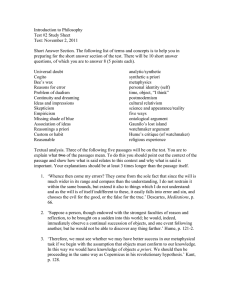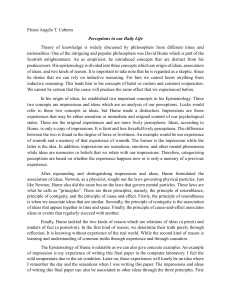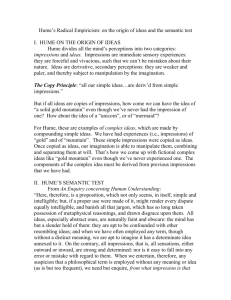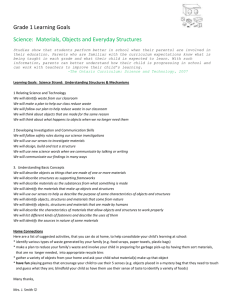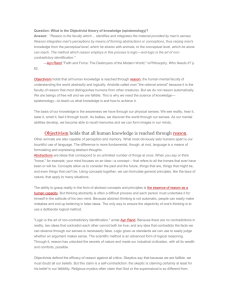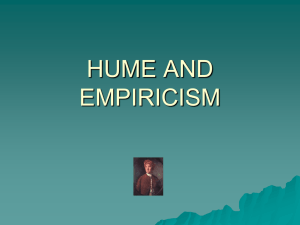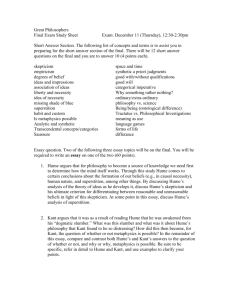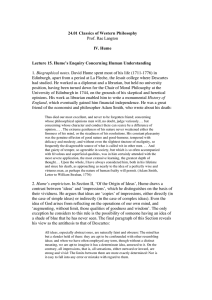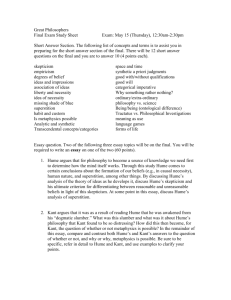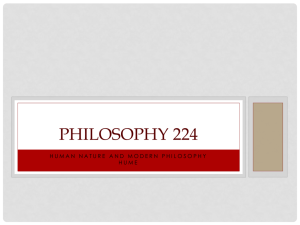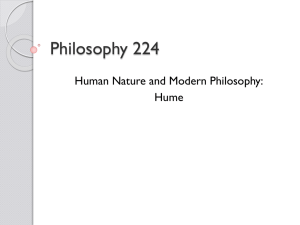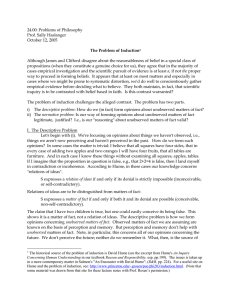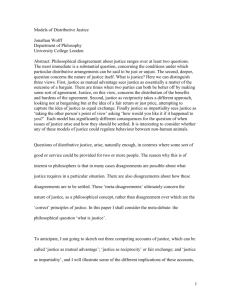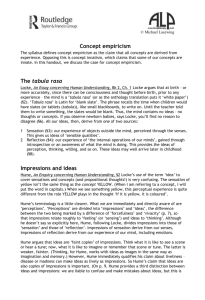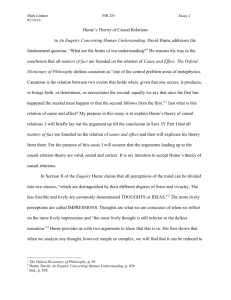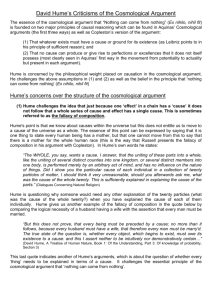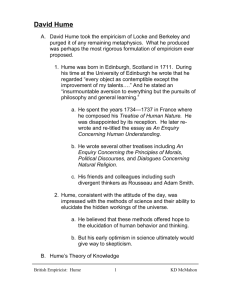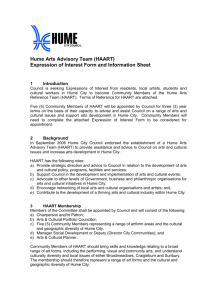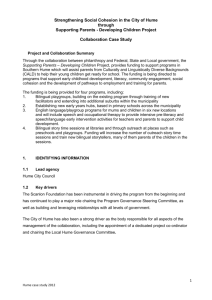Enquiry concerning Human Understanding
advertisement
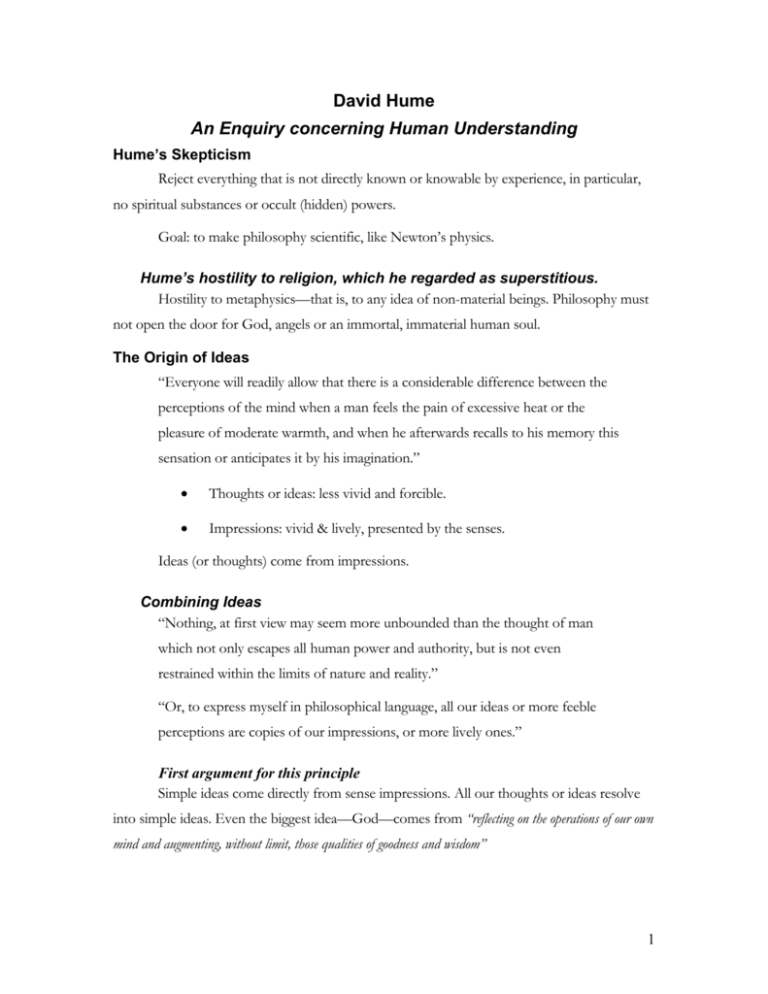
David Hume An Enquiry concerning Human Understanding Hume’s Skepticism Reject everything that is not directly known or knowable by experience, in particular, no spiritual substances or occult (hidden) powers. Goal: to make philosophy scientific, like Newton’s physics. Hume’s hostility to religion, which he regarded as superstitious. Hostility to metaphysics—that is, to any idea of non-material beings. Philosophy must not open the door for God, angels or an immortal, immaterial human soul. The Origin of Ideas “Everyone will readily allow that there is a considerable difference between the perceptions of the mind when a man feels the pain of excessive heat or the pleasure of moderate warmth, and when he afterwards recalls to his memory this sensation or anticipates it by his imagination.” Thoughts or ideas: less vivid and forcible. Impressions: vivid & lively, presented by the senses. Ideas (or thoughts) come from impressions. Combining Ideas “Nothing, at first view may seem more unbounded than the thought of man which not only escapes all human power and authority, but is not even restrained within the limits of nature and reality.” “Or, to express myself in philosophical language, all our ideas or more feeble perceptions are copies of our impressions, or more lively ones.” First argument for this principle Simple ideas come directly from sense impressions. All our thoughts or ideas resolve into simple ideas. Even the biggest idea—God—comes from “reflecting on the operations of our own mind and augmenting, without limit, those qualities of goodness and wisdom” 1 Second Argument If a man is born without a particular organ of sensation, he is not susceptible to the corresponding ideas. “A blind man can form no notion of colors; a deaf man of sounds.” Restore the sense, and you open a new inlet for fresh ideas. Consequence of this principle “When we entertain, therefore, any suspicion that a philosophical term is employed without any meaning or idea…, we need but enquire, from what impression is that supposed idea derived?” “By bringing ideas into so clear a light we may reasonably hope to remove all dispute which may arise concerning their nature and reality.” What can be known? “All objects of human reason or enquiry may naturally be divided into two kinds, to wit, relations of ideas and matters of fact.” Relations of ideas: mathematics The Pythagorean theorem 3 x 5=½ x 30 These truths don’t depend on any existing thing. They are always and everywhere true. Matters of fact These are not determined by pure reason. The contrary of every matter of fact is still possible. That the sun will not rise tomorrow is not self-contradictory. We can imagine it. So what makes anything true, beyond the testimony of our senses? What is Hume worried about? Descartes said that he proved he had an immaterial thinking self. William Paley said that the order of the universe proved there is a God to put it in order. Many believed that the laws of physics were absolute. But absolute laws require an absolute Lawgiver—a God. 2 Hume wants to show that we can’t really know anything except what we can experience with our senses. The Challenge: Cause & Effect The watch proves people were on the island. So, does the harmony of the universe prove that God exists? I know my friend is in France, because I saw a letter from him. So, from the existence of ancient Scriptures can I know that God exists? Are cause-effect arguments a priori and necessary? Causal arguments not a priori “I shall venture to affirm, as a general proposition which admits of no exception, that the knowledge of this relation is not, in any instance, attained by reasonings a priori, but arises entirely from experience, when we find that any particular objects are constantly conjoined with each other.” Causes & Effects “Causes and effects are discoverable not by reason but by experience.” Who would guess that two smooth pieces of marble would stick tightly together? Or that a lodestone (natural magnet) would attract iron? “Who can assert that he can give the ultimate reason why milk or bread is proper nourishment for a man, not for a lion or a tiger?” The real basis for causal argument Not reason, but custom: The effect can never be found in the cause, not in the billiard ball nor in the falling stone. There is no a priori law of cause & effect. “Every effect is a distinct event from its cause.” The basis for scientific reasoning We know that bread nourishes, but there is no known connection between its sensible properties and its nutritional powers. Only experience—not reason—tells us that bread is nutritious. We predict that a loaf of bread will nourish, not on the basis of reason, but because that has been our experience. The Logical Problem “These two propositions are far from being the same, 3 1. I have found that such an object has always been attended with such an effect, and 2. I foresee that other objects which are in appearance similar will be attended with similar effects.” We recognize this inference as valid, but why? No Logical Connection The mind naturally and normally moves from past experiences to future expectations. We all do this…all the time. But—Hume’s point—the connection of experience to expectation is not one of reason. “But if you insist that the inference is made by a chain of reasoning, I desire you to produce that reasoning.” In other words… It’s perfectly reasonable to expect the sun to rise tomorrow or to see rain when dark clouds roll in. BUT there is no eternal law of reason that requires these things to happen. There is no causal law…only patterns that we get used to. No Hidden Powers Someone completely new to the world would not know what to expect from it. Nothing in his growing experience reveals the secret powers by which one thing causes another. “He would not, at first, by any reasoning, be able to reach the idea of cause and effect; since the particular powers by which all natural operations are performed never appear to the senses.” Custom and Habit “Custom, then is the great guide of human life. It is that principle alone which renders our experience useful to us …” “If I ask why you believe any particular matter of fact which you relate, you must tell me some reason; and this reason will be another fact, connected with it. But as you cannot proceed in the manner ad infinitum, you must at last terminate in some fact which is present to your memory or senses; or must allow that your belief is entirely without foundation.” 4 In Conclusion “All belief of matter of fact or real existence is derived merely from some object present to the memory or senses, and a customary conjunction between that and some other object.” “All these operations [of the mind] are a species of natural instincts, which no reasoning of process of thought can understanding is able either to produce or to prevent.” Hume’s importance A ‘ruthless’ empiricist: if an idea cannot be traced back to sense experience, it is useless and false. Foundation for the belief that only the physical sciences can give us truth. So religion, ethics, and culture have nothing to do with objective reality. Strongly anti-metaphysical, he had a profound effect on philosophy in the first half of the 20th Century, especially in England and the US. 5
